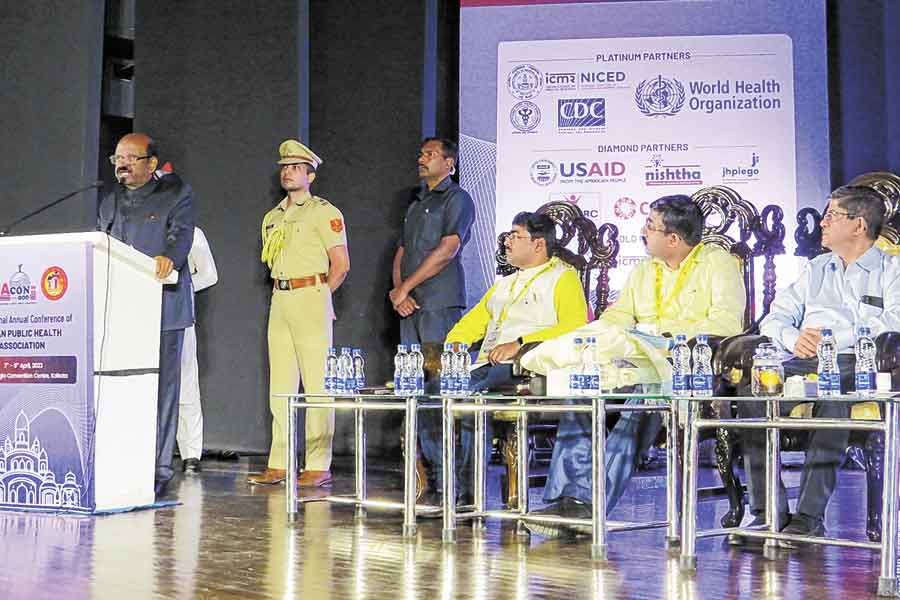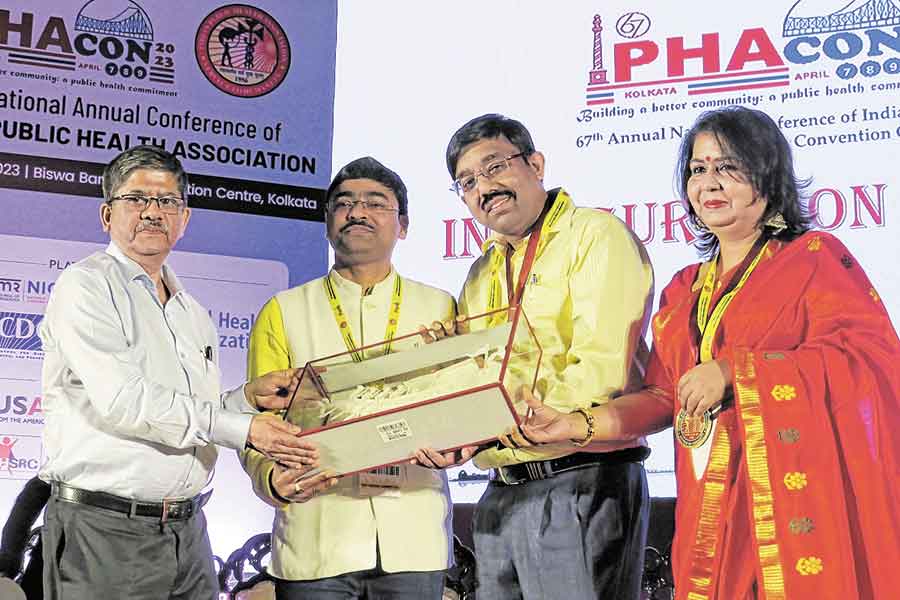Health is not the sole responsibility of the government and people here do not take their own well-being seriously, resulting in pressure on the medical infrastructure.
“For the betterment of the community, individuals have to be responsible for their own health. For that, the community should be empowered and made aware. Doctors can only give advice. It is upto people to follow that advice. Once people take their own health seriously, they become responsible. Community health is a huge subject. If that is taken care of, then the apex health centres will not face pressure as patient load will be reduced. It will be more cost-effective. The government and the NGOs are doing what is their duty. But patients have to do their bit for their own health as well,” director of medical education Debasis Bhattacharyya told The Telegraph Salt Lake at the opening of the Indian Public Health Association (IPHA) Conference 2023.
The three-day conference in April saw 800 public health professionals from across the country converge on the Biswa Bangla Convention Centre in New Town.
The last time Calcutta hosted the national conference was in 2015. “It was held in conjunction with the 2015 World Congress in Public Health,” recalled Dr Kaushik Mitra, the IPHA secretary- general who is a resident of Purbachal.
A pre-conference continuing medical education programme was also held for students at the Infectious Diseases Hospital in Beleghata.
“Ours is the oldest and largest public health association. It was founded in 1956 in Calcutta with the motto 'health for all'. It is sad that even so many years after Independence, we are still aspiring towards that basic aim. We have made advancements but not achieved the goal, largely due to our huge population,” said IPHA president Dr Sanghamitra Ghosh, who took over the reins at the conference, becoming the first eastern India representative in the chair after a gap of 21 years.
The association has over 10,000 members. “Our members are not just doctors. Public health cannot be directed by doctors alone. There are scientists, microbiologists, social scientists, nurses, midwives, phlebotomists, MPH students... IPHA gives voice to them all,” added the resident of Avenida, in Action Area II.

Governor C.V. Ananda Bose addresses the inaugural session. Pictures by Sudeshna Banerjee
Dr D.C.S. Reddy, former head of the department of community medicine at Benaras Hindu University, was given the lifetime achievement award. The HIV specialist spoke of eradicating AIDS in India by 2030.
Governor C.V. Ananda Bose, who inaugurated the conference, lauded the medical fraternity for their role during the pandemic. “India has just one doctor for every 2,140 people but you proved that quality matters more than quantity.” He spoke of a custom among the martial Kurichiya tribe in his native state of Kerala of leaving a young man, once he reaches adulthood, tied to a tree deep in the jungle with wild animals on the prowl. “All night, he wonders how his father or his tribal brothers could do this to him. At dawn, when he is untied, he finds that his father was standing behind him all night with a drawn sword and with him were the tribal chieftains with raised axes. That is the protection that the medical fraternity gave us as sentinels during the pandemic. India is indebted to you,” the governor said, to huge self-congratulatory applause from the audience.
The governor also handed over two awards on his own. “He had asked us to suggest a name he could felicitate for rendering service to the nation,” an official said.
The name chosen for the Governor's award of excellence was of Prof Jayaprakash Muliyil, an eminent epidemiologist who is credited with setting up the MSc and PhD programmes in epidemiology in India. The other award the governor gave away was a “surprise” to the organisers, as it went to IPHA itself.
Dr C.S. Pandav, former head of the department of the Centre for Community Medicine at the All India Institute of Medical Sciences, Delhi who received the Padma Shri in 2021, inaugurated the scientific sesssion.
Speaking for science
Speaking to The Telegraph Salt Lake on the sidelines of the launch, Ghosh later said: “We had submitted five advisories to the government when the pandemic broke out. We spoke in favour of science though some (directives) went against (government policy). Childhood vaccination, we said, was not needed as the long-term results are not known, neither was the booster dose. There is hardly anyone left in India who did not get Covid. Natural infection gives a far stronger immunity cover than a vaccine-induced one.”
“The only people who were supposed to offer advice during the pandemic were public health experts. But sadly, everyone, from bureaucrats to chest physicians, were having a say. Even the national committee on Covid vaccination had all kinds of people, other than a few of us,” Ghosh rued, adding that people had understood what public health was after the pandemic.
Even if infections are rising again, the IPHA president said this was not a cause for worry. The virus, she pointed out, was there and would never go away. A pandemic is triggered when sometimes a virus mutates in a specific way. “There is no need to trace and test now. It would be a waste of resources as treatment would still be the same. History says there is no immediate risk of another pandemic so soon. Season change always triggers health issues in the vulnerable segment. Even now we are asking for masks to be worn by healthcare workers only when they come in contact with patients in the ward, to cut down the risk of infection spread from them,” Dr Ghosh said.
An interesting segment of the conference was a quiz that was conducted on public health which was won by a two-member team from AIIMS Bhubaneswar.
